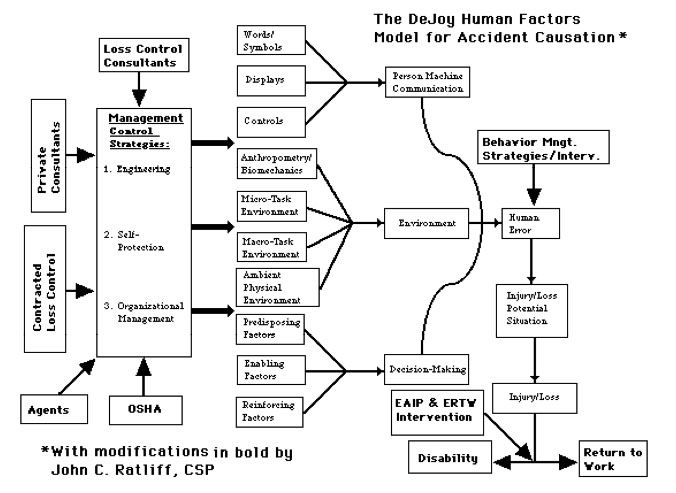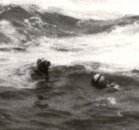- Messages
- 5,884
- Reaction score
- 2,998
- Location
- Lake Worth, Florida, United States
- # of dives
- I'm a Fish!
Dan,
I like what you are saying now, but how you said it earlier turned me off completely. In professional safety, I have been using Dr. David DeJoy's Human Factors Model for Accident Causation:
Note the "Decision-Making" component; it has Pre-disposing, Enabling and Reinforcing Factors. Your mention of peer group pressure comes under the "Reinforcing Factor" side of this model. But you ignore the other two, the Pre-disposing and Enabling Factors, in Sheck Exley's case. A person doesn't go through the process that Sheck Exley did without internal motivation. In his case, the Macro-task and Micro-task environments, as well as the
Ambient Physical Environment, where overall factors in him having a fatal dive. But the motivation cannot be external-only in such an endeavor. Accidents always have at their root causes multiple-causation. The group dynamics is a factor, but only one of many.
And, none of this has any relevance to diving deep on air (again, my definition of deep on air would be to the 120 foot level).
SeaRat
An Explorer like Sheck, or George, has a mission....they want to find the end of the cave system, or the new tunnel that connects, or the way out of the cave, into the ocean...or that Pyramid at the bottom of a Blue Hole...whatever....
They train for the mission, and they plan and prepare the right gear....At least the good explorers do....which was true of both George and of Sheck, except for the last few weeks in his life.
I had my own mission, with another deep diving pioneer friend of mine, Craig Suavely--we were shooting video of deep pinnacles off of Stuart and Fort Pierce, to Jupiter....probably Salt domes, that rose from around 400 or 500 , to as high as 200 feet deep....Craig had gotten stories from the old fisherman...Lost Elephants Graveyard ( Tarzan type stories) of these guys finding this spike 30 miles out, structure that just could not be there, but was....and it was covered in fish, and they filled up their boat with fish and had spectacular tales of this site for years to come. We dropped on numbers for close to 30 of these supposed pinnacles, and found 4 of them to be real...and covered in Oculina ( a deep water coral with it's own cool sub-environment of the marine life that lived on it). We did these dives in around 1995, on air, and they were hard---25 to 30 miles out, viz often to 8 feet or less, currents so large you both had to hold on to the float line to the surface, as the float was often pulling at over 3 mph, too fast for you to swim in doubles.
You get very excited about what you are accomplishing, and the story of the whole thing....
And this is where a guy like Sheck really needed to be with the right people--because you are so excited, and so suggestible to the romance of the story--of the enormity of the discovery and the adventure--you really DO need a VOICE OF REASON to keep you from becoming impulsive and stupid, no matter how cautious and well prepared you are. This is where the Explorer Gene makes you that much more like a little kid---the adventure becomes everything. Normal people.e are just not like this...not like the explorers. And so I was lucky to have the Voice of reason smacking me often, from my DIR buddies George and Bill , and the others that dove with us off Palm Beach to North Miami on the deep reefs and wrecks there. Some of my other friends, like Craig, were good divers, but not DIR....They would be interested, and very gradually try this and that.....
Craig was quiet and fairly introverted--he was an engineer for Pratt Whitney, and inventor of some very cool nozzles for Jet engines, etc...smart guy....The BUT...was that Craig would want to dive, when he wanted to dive.....and one day he wanted to dive a deep wreck off of Palm Beach --on a day I had to work--and so he went solo...This was a day with a huge ripping monster current, and the account from the boat captain, was that a minute from Craig splashing in, the ball started flying, and loading up like it would sink....for about 20 or 30 seconds...and then it popped up and the stress was off it...so the Captain figured Craig had missed the wreck...What had happened, we surmised, was that Craig came flying into the 280 foot deep wreck, tried to swim hard to get close enough to hook off, and built up so much CO2 that he got an Ox Tox hit and blacked out.
When I went looking for him the next day, with Nigel( another of the DIR group), I had the float line, the current was still ripping, we dropped at about 300 feet per minute, and I saw us flying up into the wreck---I swam fast forward so I would have slack ( but not fast enough to build any CO2 to speak of), and caught a big Hauser( huge rope) on the deck, and this stopped me from being swept over the wreck..in the next moment, the float got to the end of the line, and I was spun around, and almost felt like my shoulders would separate....this actually pulled the big float down to about 70 feet, where it actually hit our safety diver Jim Abernethy in the back---and he thought he had been hit by a shark at first
I was able to hook off the float....but in the next ten seconds, it straightened out the metal tines, and let go...so the float was gone.
Nigel and I decided to do a quick look along the wreck....and there was no sign of Craig...We passed the wreck...the current took us along, and we followed the bottom for about 8 more minutes to see if there was any bottom structure that would "catch" a dead diver...there was not. We did our Blow and go to 100.....Nigel sent up a lift bag...and we did a fast deco of about 30 minutes...the boat found us almost immediately.
If I had it to do over again, I would have pushed Craig more on our DIR ideas...I had met him freedive spearfishing, and he was a strong diver....but also used to doing solo stuff. As a buddy team, I don't believe the same result would have occurred....
I guess the point is that even these guys that are the "Explorers".....these guys are people.
They have friends and families, and if they die, there is a huge sense of loss ( and this loss should not have happened).
Craig's family almost lost their house, because the insurance company did not get to see a body....The family lost a loved one, I lost a good friend, and I decided for all future situations, if a "friend" of mine was talking about doing something that I knew was stupid, and he really did as well...there was no way I would just say--go ahead...your an adult--this would be tantamount to assisting in a suicide. If I really thought the plan was stupid, I would figure out a way to make my point.
I never did lose a close friend after this.....but I would continue to have friends, that would have "their friends" do something stupid, and die.....and I would end up doing more body recovery dives. Like the Jane Orenstein Tech diving death....or the IANTD Triple Death Tragedy with Andre Smith ( where Det John Claypool was one of the dead, and a close friend of my brother Kirk).
And so....I get preachy here on SB, as I did on rec. scuba, because if I did not say something, when I think it might have helped to prevent a death of someone not so far separated from me ( degrees of separation) , then I would be complicit in the death. And how we act in the peer group of our deep diving friends, is a big deal.
And this is why I have butted heads with a few of you guys about why I think sometimes you do have to be personally involved in helping your Explorer friends make good decisions. Because while a good explorer is heavily trained and prepped, and highly fit, and while he should have a good plan....sometimes the kid in him, the part in him that helps make him an explorer, needs a wake up call. Maybe you guys don't think the Antarctic explorers were worthy of friends, or the guy in the row boat just had no friends.....I don't know....What I do know, is that too many diving deaths, of tech divers and explorer divers, were deaths of friends--friends that should have had someone close to them, smacking them on the head, saying "what are you thinking", rather than getting some "poser" that cares about nothing but the TV story and the Fame, and that believes that the record is worth more than the life.






